“Visitors flocking to Rio de Janeiro for this summer's Olympic Games will find both dramatic landscapes and polluted, junk-filled water in the finger-like inlet that forms the city's shoreline and harbor. Guanabara Bay, which carves into southeast Brazil from the Atlantic Ocean, literally gave the city its name when Portuguese mariners mistook it for a “rio”, or “river”. Four centuries later, the bay is preparing to welcome another sort of seafarer – Olympic sailors who will navigate it when Rio 2016 kicks off in August. But for those who call the bay home, the Games are already a disappointment. After Rio won the rights in 2009 to host the Olympics, local officials vowed to clean up Guanabara Bay. But an economic downturn, political instability and a historic corruption scandal left many of the promises made back then, when the country was booming, hopelessly out of reach. By 2014, Rio authorities had already given up on the cleanup. Now they are just trying to keep the parts of the bay that Olympic sailors will traverse free from debris that in recent months has included floating refrigerators, couches and even corpses. After decades of development, raw sewage, industrial waste and litter have poured in from a metropolitan area that is home to more than 11 million people. While the shores are verdant and telegenic, and some people still use the bay for recreation, the water is so dirty that scientists and physicians warn that contact with it can lead to viral and bacterial infections. Locals who once plied their livelihood in the bay can now barely get by”. – Ricardo Moraes via Reuters
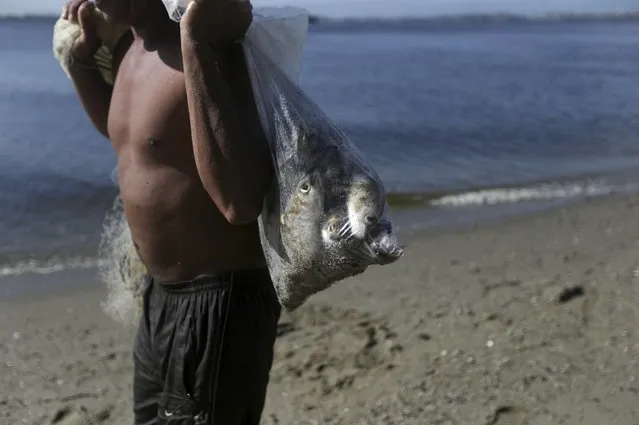
Adriel Oliveira, 35, who works on civil construction and has fished on Guanabara Bay for 16 years, carries a bag of fish in Rio de Janeiro Brazil, January 6, 2016. Few features capture the beauty, or the problems, of one of the world's most dramatic urban landscapes like Guanabara Bay - the finger-like inlet that forms the shoreline and harbor for Rio de Janeiro. The bay, which carves into southeast Brazil from the Atlantic Ocean, literally gave Rio its name when Portuguese mariners mistook it for a “rio”, or “river”. Four centuries later, the bay is preparing to welcome another sort of seafarer – Olympic sailors, who will navigate the bay when the 2016 Rio Olympics kick off in August. (Photo by Ricardo Moraes/Reuters)
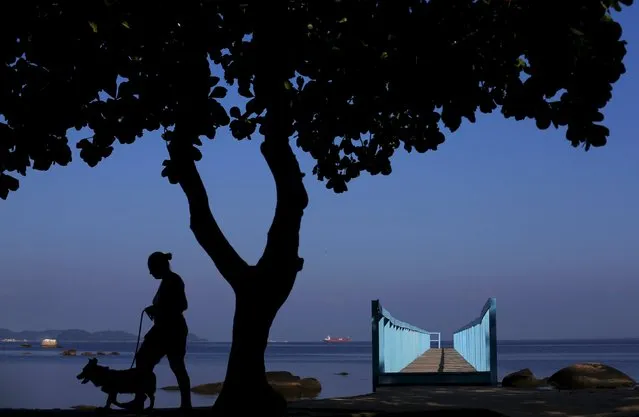
A woman walks with her dog on Paqueta island in the Guanabara Bay in Rio de Janeiro Brazil, April 12, 2016. (Photo by Ricardo Moraes/Reuters)
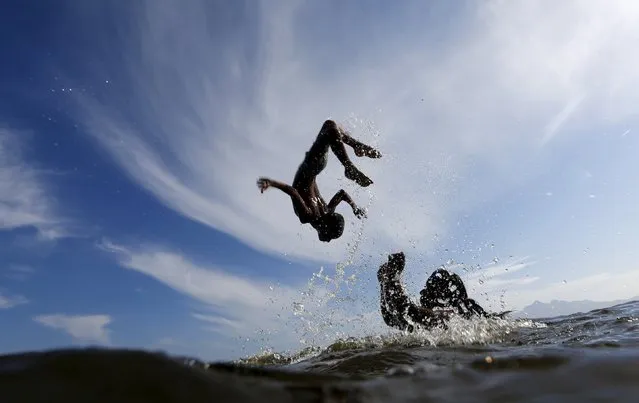
Children play in the waters of Guanabara bay at Bica beach in Rio de Janeiro Brazil, January 10, 2016. (Photo by Ricardo Moraes/Reuters)
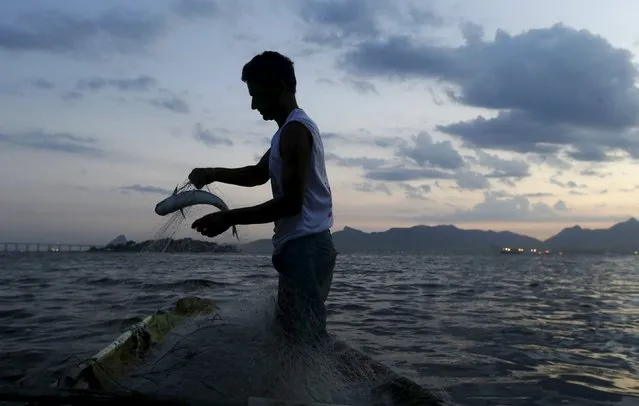
A fisherman holds a fish caught in his net in the waters of Guanabara Bay in Rio de Janeiro Brazil, January 8, 2016. (Photo by Ricardo Moraes/Reuters)
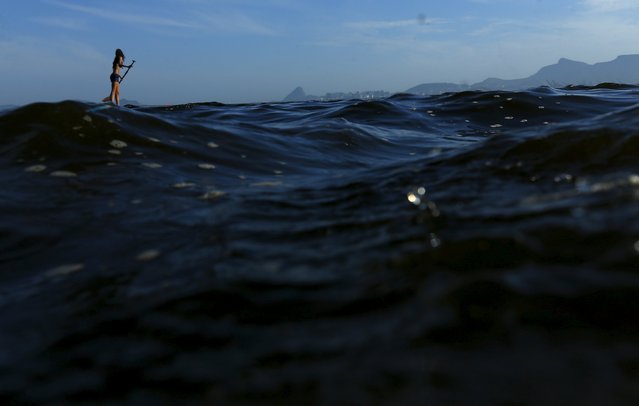
A girl paddles on her stand-up board on the waters of Guanabara bay at Bica beach in Rio de Janeiro Brazil, January 10, 2016. (Photo by Ricardo Moraes/Reuters)
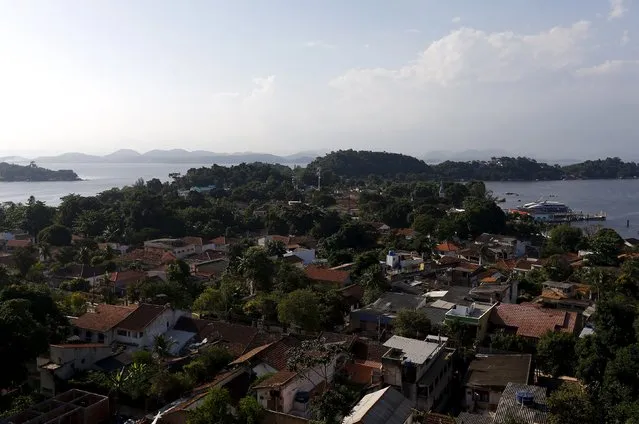
Houses stand on Paqueta island in the Guanabara Bay in Rio de Janeiro Brazil, April 13, 2016. (Photo by Ricardo Moraes/Reuters)
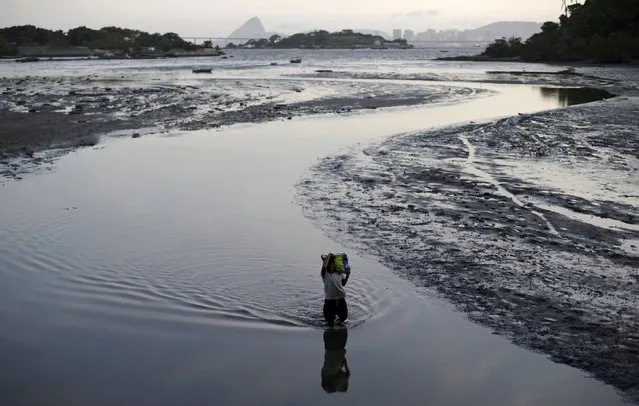
A fisherman carries a bag of fish as he walks in a channel which flows into Guanabara Bay in Rio de Janeiro Brazil, January 7, 2016. (Photo by Ricardo Moraes/Reuters)
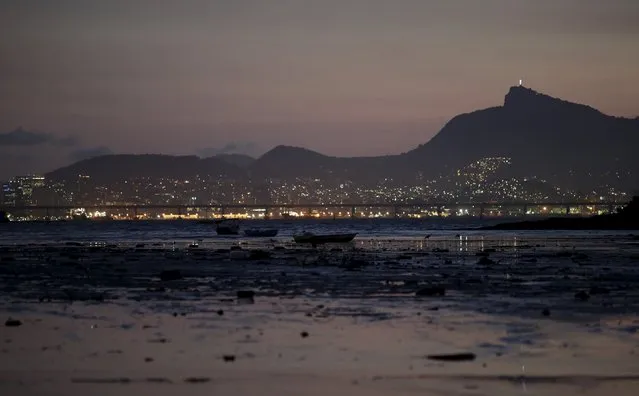
A view of the Guanabara Bay in Rio de Janeiro Brazil, January 7, 2016. (Photo by Ricardo Moraes/Reuters)
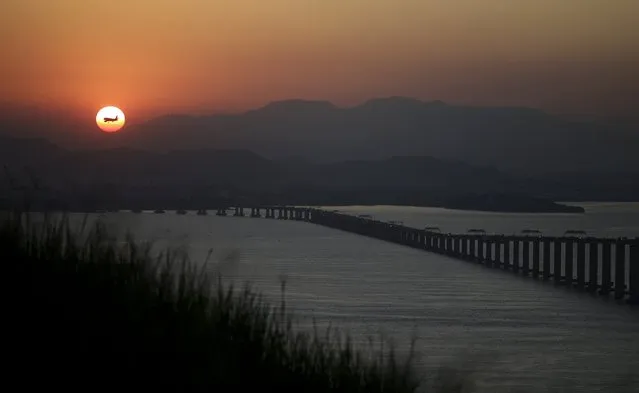
An airplane flies in front of the sun as it sets above the Guanabara Bay in Rio de Janeiro Brazil, April 6, 2016. (Photo by Ricardo Moraes/Reuters)
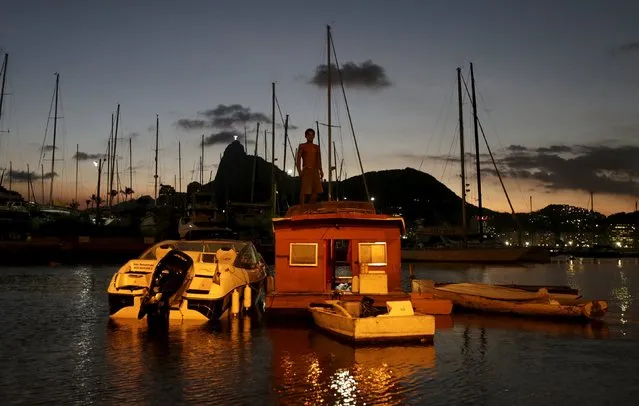
Naval carpenter Alexandro de Oliveira, 41, stands atop his boat house in the waters of the Guanabara Bay in Rio de Janeiro Brazil, April 5, 2016. (Photo by Ricardo Moraes/Reuters)
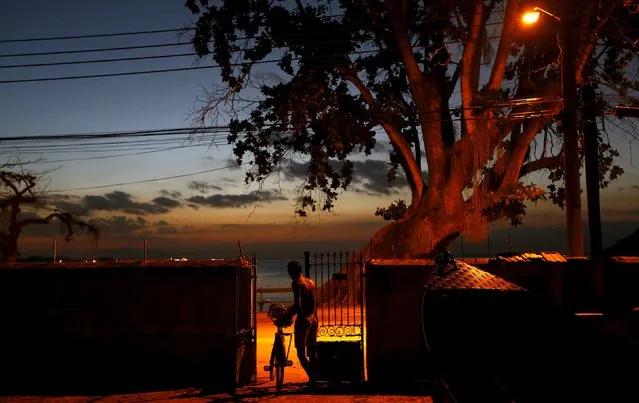
A man carries his bicycle as he leaves his house on Paqueta island in the Guanabara Bay in Rio de Janeiro Brazil, April 13, 2016. (Photo by Ricardo Moraes/Reuters)
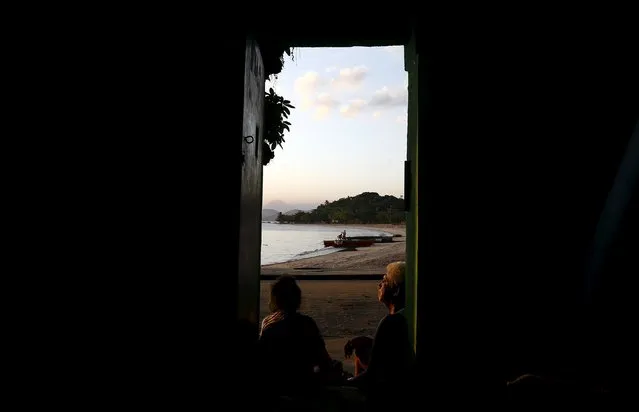
Helio dos Santos (R), 72, sits by the door of his house with his wife Zilda Santos, 71, on Paqueta island in the Guanabara Bay in Rio de Janeiro Brazil, April 13, 2016. (Photo by Ricardo Moraes/Reuters)
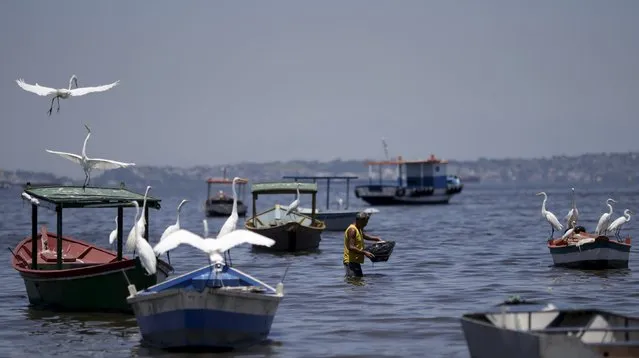
A man carries fish in the waters of Guanabara Bay in Sao Goncalo Brazil, January 7, 2016. (Photo by Ricardo Moraes/Reuters)
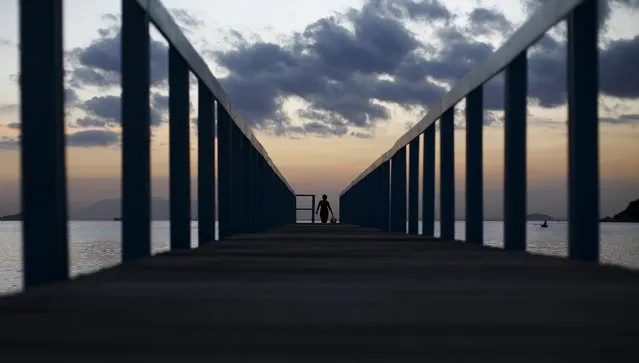
A youth stands on the Ponte da Saudade "Longing Bridge" at Paqueta island in Guanabara Bay in Rio de Janeiro Brazil, April 13, 2016. (Photo by Ricardo Moraes/Reuters)
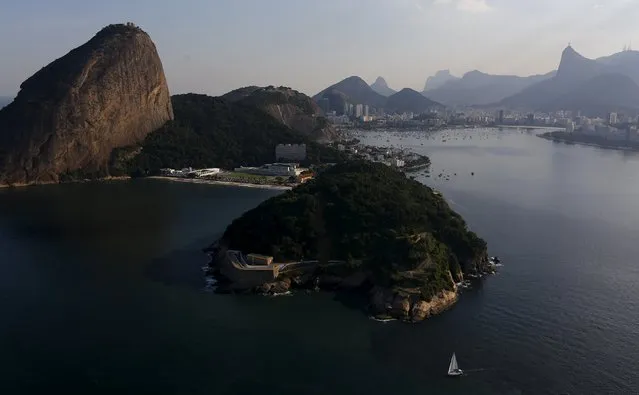
A boat sails in Guanabara Bay in Rio de Janeiro, Brazil, April 25, 2016. (Photo by Ricardo Moraes/Reuters)
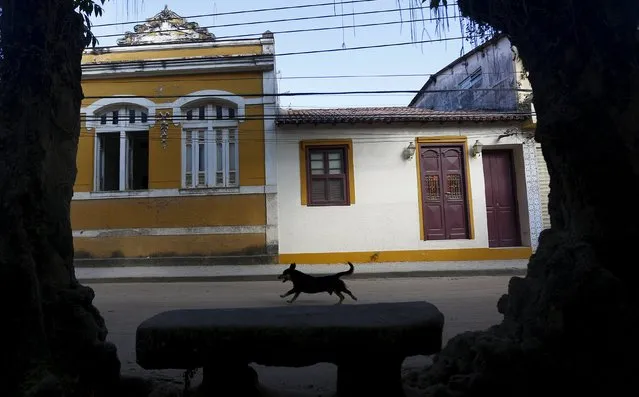
A dog walks on Paqueta island in Guanabara Bay in Rio de Janeiro Brazil, April 12, 2016. (Photo by Ricardo Moraes/Reuters)
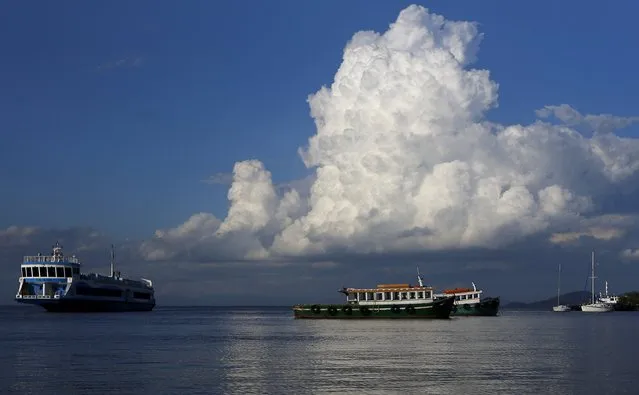
A ferry (L) arrives at Paqueta island in Guanabara Bay in Rio de Janeiro Brazil, April 13, 2016. According to the concessionaire 110,000 passengers travel on the ferries, which connect neighborhoods and cities surrounded by the Guanabara Bay to Rio de Janeiro's downtown, per day. (Photo by Ricardo Moraes/Reuters)
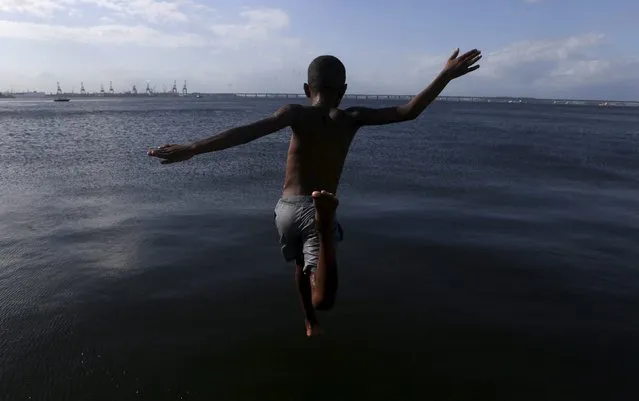
A child jumps into the waters of Guanabara Bay in Rio de Janeiro's downtown Brazil, January 5, 2016. (Photo by Ricardo Moraes/Reuters)
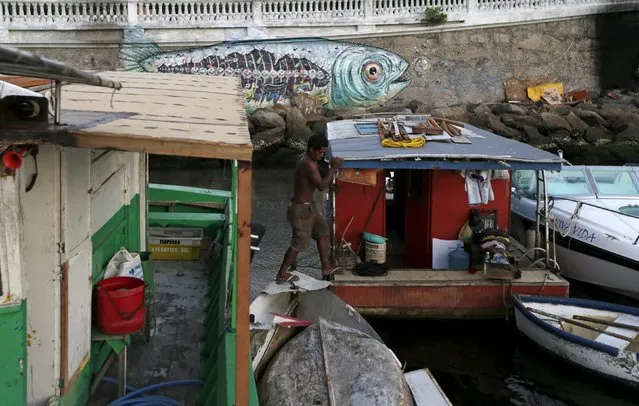
Naval carpenter Alexandro de Oliveira, 41, jumps from a boat in which he was doing a job to his boat house, on the waters of Guanabara Bay in Rio de Janeiro Brazil, April 4, 2016. (Photo by Ricardo Moraes/Reuters)
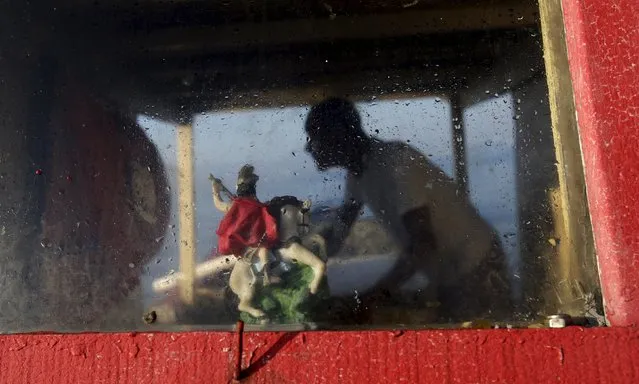
A fisherman is pictured behind an image of Saint George during fishing session on the waters of Guanabara Bay in Rio de Janeiro Brazil, January 8, 2016. (Photo by Ricardo Moraes/Reuters)
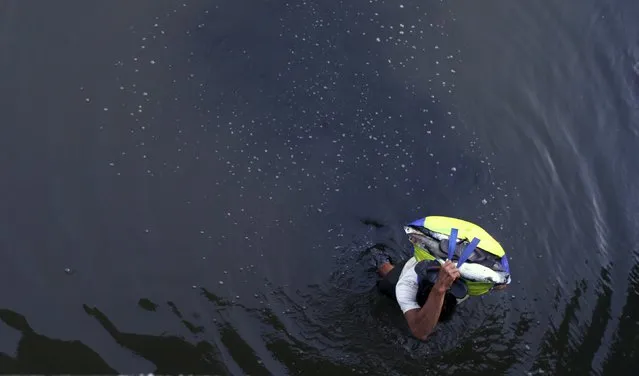
A fisherman carries a bag of fish as he walks in a channel which flows into Guanabara Bay in Rio de Janeiro Brazil, January 7, 2016. (Photo by Ricardo Moraes/Reuters)

Naval carpenter Alexandro de Oliveira, 41, is pictured inside his boat house on the waters of Guanabara Bay in Rio de Janeiro Brazil, April 5, 2016. (Photo by Ricardo Moraes/Reuters)

Adriel Oliveira, 35, who works on civil construction and has fished on Guanabara Bay for 16 years, carries a bag of fish in Rio de Janeiro Brazil, January 6, 2016. Few features capture the beauty, or the problems, of one of the world's most dramatic urban landscapes like Guanabara Bay - the finger-like inlet that forms the shoreline and harbor for Rio de Janeiro. The bay, which carves into southeast Brazil from the Atlantic Ocean, literally gave Rio its name when Portuguese mariners mistook it for a “rio”, or “river”. Four centuries later, the bay is preparing to welcome another sort of seafarer – Olympic sailors, who will navigate the bay when the 2016 Rio Olympics kick off in August. (Photo by Ricardo Moraes/Reuters)

A woman walks with her dog on Paqueta island in the Guanabara Bay in Rio de Janeiro Brazil, April 12, 2016. (Photo by Ricardo Moraes/Reuters)

Children play in the waters of Guanabara bay at Bica beach in Rio de Janeiro Brazil, January 10, 2016. (Photo by Ricardo Moraes/Reuters)

A fisherman holds a fish caught in his net in the waters of Guanabara Bay in Rio de Janeiro Brazil, January 8, 2016. (Photo by Ricardo Moraes/Reuters)

A girl paddles on her stand-up board on the waters of Guanabara bay at Bica beach in Rio de Janeiro Brazil, January 10, 2016. (Photo by Ricardo Moraes/Reuters)

Houses stand on Paqueta island in the Guanabara Bay in Rio de Janeiro Brazil, April 13, 2016. (Photo by Ricardo Moraes/Reuters)

A fisherman carries a bag of fish as he walks in a channel which flows into Guanabara Bay in Rio de Janeiro Brazil, January 7, 2016. (Photo by Ricardo Moraes/Reuters)

A view of the Guanabara Bay in Rio de Janeiro Brazil, January 7, 2016. (Photo by Ricardo Moraes/Reuters)

An airplane flies in front of the sun as it sets above the Guanabara Bay in Rio de Janeiro Brazil, April 6, 2016. (Photo by Ricardo Moraes/Reuters)

Naval carpenter Alexandro de Oliveira, 41, stands atop his boat house in the waters of the Guanabara Bay in Rio de Janeiro Brazil, April 5, 2016. (Photo by Ricardo Moraes/Reuters)

A man carries his bicycle as he leaves his house on Paqueta island in the Guanabara Bay in Rio de Janeiro Brazil, April 13, 2016. (Photo by Ricardo Moraes/Reuters)

Helio dos Santos (R), 72, sits by the door of his house with his wife Zilda Santos, 71, on Paqueta island in the Guanabara Bay in Rio de Janeiro Brazil, April 13, 2016. (Photo by Ricardo Moraes/Reuters)

A man carries fish in the waters of Guanabara Bay in Sao Goncalo Brazil, January 7, 2016. (Photo by Ricardo Moraes/Reuters)

A youth stands on the Ponte da Saudade "Longing Bridge" at Paqueta island in Guanabara Bay in Rio de Janeiro Brazil, April 13, 2016. (Photo by Ricardo Moraes/Reuters)

A boat sails in Guanabara Bay in Rio de Janeiro, Brazil, April 25, 2016. (Photo by Ricardo Moraes/Reuters)

A dog walks on Paqueta island in Guanabara Bay in Rio de Janeiro Brazil, April 12, 2016. (Photo by Ricardo Moraes/Reuters)

A ferry (L) arrives at Paqueta island in Guanabara Bay in Rio de Janeiro Brazil, April 13, 2016. According to the concessionaire 110,000 passengers travel on the ferries, which connect neighborhoods and cities surrounded by the Guanabara Bay to Rio de Janeiro's downtown, per day. (Photo by Ricardo Moraes/Reuters)

A child jumps into the waters of Guanabara Bay in Rio de Janeiro's downtown Brazil, January 5, 2016. (Photo by Ricardo Moraes/Reuters)

Naval carpenter Alexandro de Oliveira, 41, jumps from a boat in which he was doing a job to his boat house, on the waters of Guanabara Bay in Rio de Janeiro Brazil, April 4, 2016. (Photo by Ricardo Moraes/Reuters)

A fisherman is pictured behind an image of Saint George during fishing session on the waters of Guanabara Bay in Rio de Janeiro Brazil, January 8, 2016. (Photo by Ricardo Moraes/Reuters)

A fisherman carries a bag of fish as he walks in a channel which flows into Guanabara Bay in Rio de Janeiro Brazil, January 7, 2016. (Photo by Ricardo Moraes/Reuters)

Naval carpenter Alexandro de Oliveira, 41, is pictured inside his boat house on the waters of Guanabara Bay in Rio de Janeiro Brazil, April 5, 2016. (Photo by Ricardo Moraes/Reuters)
28 Apr 2016 12:13:00,
post received
0 comments
